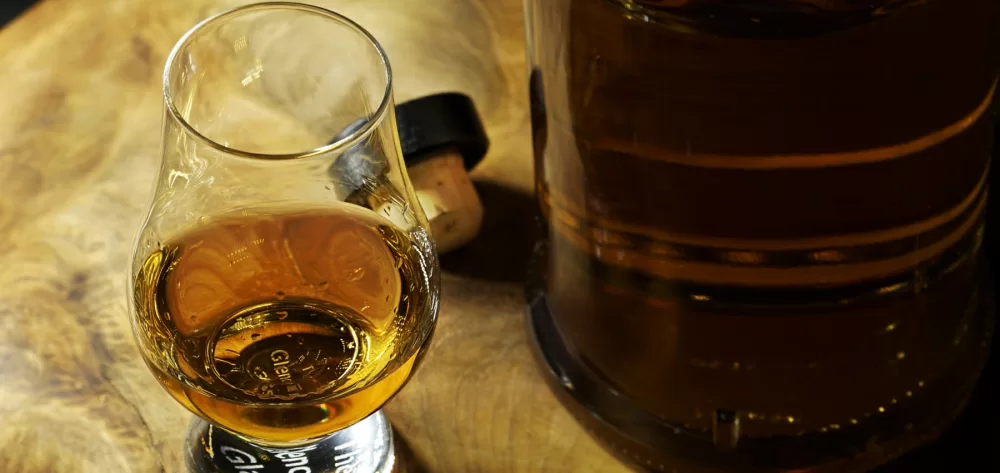For some whisky lovers, whisky is more than just a pleasurable drinking experience. It is also an investment opportunity. Here, moneyland.ch answers the most important questions about investing in whisky.
Why should I consider investing in whisky?
The worldwide demand for whisky – or whiskey in the case of American and Irish varieties – has grown without exception in recent years, and all forecasts point towards continued growth. The particularly strong demand for exceptional whiskies can is apparent in two different indices. The Rare Whisky Icon Index shows that the value of the 100 most important collectible whiskies has grown by 300 percent since the end of 2012. According to the Knight Frank Wealth Report, the value of high-grade, exclusive whiskies has grown by 322 percent over the past ten years. That is substantially higher than the returns of other tangible assets like designer handbags (60 percent), exclusive watches (147 percent), and fine wine (149 percent). Those figures show that whisky has serious investment potential.
What are the risks of investing in whisky?
High potential returns normally come with high potential risks. There is no guarantee that the prices paid for fine whiskies will continue to climb. There is also no way to rule out the possibility of making a major loss. Investing in fine whiskies requires a profound knowledge of the whisky market and industry. Additionally, only a small selection of whiskies are really suitable for collectors and investors. Compared to the markets for fine art and exclusive watches, the market for fine whisky is relatively small.
The whisky market too is not free from fraudulent actors. For inexperienced investors, it can be very difficult to tell an original from a counterfeit. If you are interested in investing in whisky, you should first take time to build your knowledge and to get informed by competent experts. Ideally, you should understand and enjoy whisky enough yourself that you would be happy to keep it just for your own enjoyment should the market collapse.
Another possible risk is that it can be difficult to find buyers for your whiskies. The market is very illiquid compared to many investment products traded on stock exchanges. Selling whiskies when the time comes also requires a fair amount of effort, and generates costs.
Which whiskies should I invest in?
Only a very small portion of the whisky produced globally is suitable for investment. Most whiskies are produced for the consumer market with the assumption that they will be consumed shortly after production. The primary factors that affect the cost of whisky are quality and rarity. Pay close attention to whiskies that are only produced in small quantities and sell out quickly. You should also pay attention to trends in the whisky market as a whole.
The amount of capital you have available to invest in whisky is also a key factor in determining which whiskies you can invest in. The bottlings tracked by the Rare Whisky Icon Index are broadly recognized as collectible whiskies, but the price per bottle is very high. The list primarily includes Scotch whiskys. The prices published by auction houses provide a good reference point for understanding which whiskies are in demand among collectors.
There are also distilleries outside of Scotland, including some Japanese distilleries, that have excellent reputations. Although Switzerland is not particularly known for whisky, there are also Swiss distilleries that are taken seriously among whisky connoisseurs.
The ten best whisky distilleries in Switzerland, as per the Whisky Guide Schweiz:
| Distillery |
Location |
| Brennerei Lüthy |
Muhen |
| Brennerei Schwab |
Oberwil bei Büren |
| Destillerie Säntis Malt (Brauerei Locher AG) |
Appenzell |
| DIWISA Distillerie |
Willisau |
| Etter Söhne AG |
Zug |
| Langatun Distillery |
Aarwangen |
| ORMA Swiss Whisky Ltd. |
Silvaplana |
| Rugen Distillery |
Matten bei Interlaken |
| Sempione Distillery AG |
Brig-Glis |
| Werner Limacher und Sohn Roman |
Hünenberg |
Distilleries listed by whiskyguide-schweiz.ch as per October 5, 2023.
Where can I buy investment-grade whiskies?
You can buy bottled fine whiskies at specialized whisky merchants, and at established auction houses like Sotheby’s and Christie’s. It can also be worth it to buy whisky directly from small distilleries, including those you may encounter while traveling abroad. In every case, it is important to buy whisky from trusted sources only.
What should I pay attention to when storing whisky?
Properly storing your whiskies is essential for investing successfully. Pay attention to these factors:
- Temperature: The optimal storage temperature for whisky is between 15 and 20 degrees Celsius. Major and regular fluctuations in temperature should be avoided completely.
- Light: Whisky should be protected from direct light, so storing it in complete darkness is important. Ultraviolet rays not only adversely affect the whisky itself, but they can also bleach the labels that identify bottles.
- Humidity: Your storage room should have atmospheric humidity of between 50 and 60 percent.
- Position: Unlike wine, whisky bottles should be stored in an upright position. This helps to prevent the corks from becoming damp and porous.
If you do not have access to a suitable storage room, you can store your whisky with a specialized storage provider. It is also possible to store whisky in a bonded warehouse. However, using external storage providers costs money, and this detracts from your potential returns.
Can I get insurance for my investment whiskies?
Whisky stored in your home is covered by your household insurance. If your whisky collection gains in value, then the sum insured by your household insurance may no longer be sufficient to cover your collection and your other personal property. For that reason, you should occasionally adjust the sum insured to match the current value of your personal property. It is important to note, though, that household insurance only covers the basic cost of your whisky and not its collectible value.
Are there other ways to invest in whisky?
There are ways to invest without buying physical bottles of whisky. These investment solutions are available:
- Whisky barrels: Some distilleries let you buy whisky in barrels. This is normally whisky that is still in an early stage of the maturing process. Investors who buy these barrels speculate that the whisky will gain in value as it matures, so that it can be sold at a profit later on. You can buy barrels directly at distilleries, or through specialized whisky brokers. The Whiskey & Wealth Club (United Kingdom) is one example of a whisky broker. This broker stores investor’s whisky barrels in a bonded warehouse. When investing in whiskies through brokers, make sure to account for all possible fees.
- Mutual funds: There are actively-managed mutual funds that invest in whisky. These funds often have relatively high fees and their investment criteria are not always transparent.
- Whisky stocks: You can also participate in the whisky market by investing in the stocks of companies involved in the production or trade of whisky. One example is the Japanese company Suntory, which owns numerous international whisky brands. An advantage of investing in stocks over buying physical whisky is that you may receive ongoing dividends. In order to buy shares in companies, you need to have a stock brokerage account. You can compare stock brokerage accounts from Swiss banks using the online trading comparison on moneyland.ch.
- ETFs: There are currently no exchange-traded funds (ETFs) that invest solely in whisky. However, there are ETFs that invest in the beverages market on a broader scale. The Advisorshares Vice ETF (ISIN: US00768Y5454) is one example. The advantage of using ETFs instead of individual stocks is that your money is invested in many different companies instead of just one, so the risk of losing money is much lower than when you invest in just a few stocks. However, you should be aware that when you invest in an ETF that focused on just one industry sector, your investment is dependent on that one sector. So the risk is higher than when you invest across many different industry sectors. You can buy shares in ETFs using a stock brokerage account.
More on this topic:
How to invest in wine
Ways to invest money in Switzerland explained













